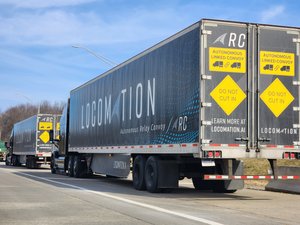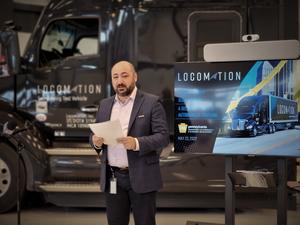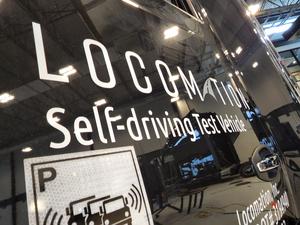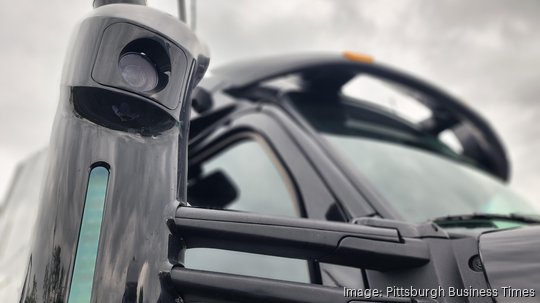
Editor's note: This story has been updated to include comments made on Feb. 26 by Locomation CEO and Co-Founder Çetin Meriçli.
Locomation Inc. has begun scaling back significant parts of its operations as the company disclosed it lacked the funds necessary to continue the commercial deployment of its autonomous trucking product at its current scale.
The startup, a 2018 spinout company from Carnegie Mellon University’s National Robotics Engineering Center that worked to develop autonomous trucking solutions, cut about 70% of its remaining workforce on Feb. 24 following furloughs it made last October. Locomation's current employee count stands at about two dozen, down from the 80 workers it had last week and roughly 120 before the cuts started. The company has not disclosed how long it will be able to retain these remaining employees as it grapples with securing additional funding, which remains a challenge amid the tech-driven economic downturn across the country.
"We are ending significant operations this month," Finch Fulton, vice president of policy and strategy at Locomation, said on Feb. 22. "Obviously, we're super disappointed; we do feel like we had all the right pieces in place. We had really smart people and a very strategic approach. … We have customers in the product market that we just, for a number of macroeconomic reasons, were unable to raise money to continue operations and to progress further to be able to get the product ready for commercial operation."
At the time of this story's original publication on Feb. 22, Fulton, who was serving as the company's official spokesperson, said the startup's CEO and Co-Founder Çetin Meriçli declined to issue a statement.
Meriçli has since responded to one of several inquiries from Pittsburgh Inno via an email he sent on Feb. 26, though he declined the opportunity to speak via phone. He downplayed the characterization that the startup was shutting down despite the prior official statements made by the company.
"We are pursuing different options and managing our runway in order to realize the best possible future for the company," Meriçli said in an email statement. "We continue to pursue several different financing options."
Fulton had said the remaining employees will stick around in the coming weeks.
"The specific numbers, I think, are tricky, between a dozen-to-two dozen people," Fulton said. "You've got to figure you've got people who have to take all the equipment off the trucks, you have to have somebody who can drive the trucks to wherever they're sold, you got to have people to pay the bills and everything and then also to move the stuff out, a facilities person."
The company has its tech equipped on six tractor rigs and was in the midst of upgrading several to its latest generation of cameras, sensors and computers. Meriçli said in a written statement that Locomation’s tech would “not at the moment” be coming off its trucks. He also said its trucks would “not at the moment” be sold to other parties, but he did not elaborate further.
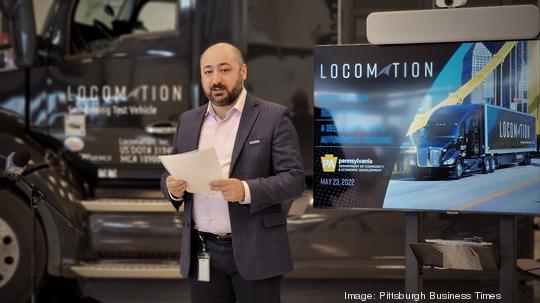
It remains to be seen if Locomation's most recent layoffs will ultimately be enough to run the company for any sustainable amount of time going forward. Locomation previously had said it planned to ship its commercial autonomous trucking product by the end of the year to at least one of its four partners.
"We've tried certainly, but we've just been unsuccessful in raising any significant funds that can keep us going," Fulton said.
Fulton said the company does still have enough funds to fulfill outstanding obligations with partners.
Locomation raised an estimated $60 million in outside investment since its genesis, a good amount of it locally from Pittsburgh-based investment firms.
The company's flagship product — Autonomous Relay Convoy — looked to double the range of a trucking operation by having two trucks operate together with a lead truck driven by a human in front of a follower truck that drove itself autonomously while a driver inside of it remained off duty. The two truck operators would swap roles during a trip when one hit the daily maximum drive hours.
Locomation frequently stated it had one of the most viable paths to a commercial launch of an autonomous trucking solution across the country due to this ARC approach, which had the ability to more easily comply with state and federal regulations when it came to placing road warning signage in the event of a breakdown, a challenge that has yet to be clearly solved for autonomous trucking operations that lack a human driver on board to perform this action.
And just a few weeks ago, Locomation began offering stakeholders and members of the media ride-along tours to see its tech work on public roadways. Those ride-along tours followed a recently completed 250-mile-long round trip between Pittsburgh and Erie where Locomation further validated its tech.
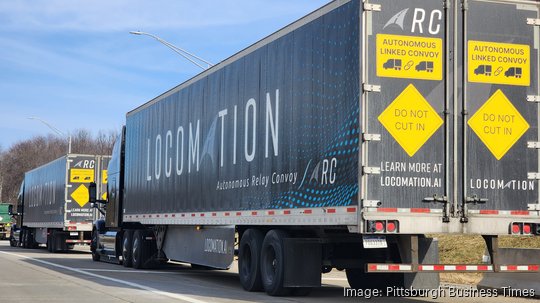
Locomation also served as one of the lead companies that lobbied legislators in Harrisburg to pass a bill that would permit autonomous driving without human operators needing to be behind the wheel, an effort that ultimately proved successful last November. Following that legislation's passage, Meriçli said the company was "just going to go blasting" with its commercial deployment timeline once its tech was ready. It lined up partnerships with Wilson Logistics, PGT Trucking, Christenson Transportation and Stevens Trucking Co. to deploy that tech across more than 1,000 trucks in the coming years.
The news about Locomation is the latest blow to Pittsburgh's startup scene following the sudden closure of autonomous vehicle peer Argo AI LLC, which last October closed its Strip District doors where it employed about 700 people locally after its main investors — Ford Motor Co. and Volkswagen AG — announced they'd no longer fund the venture. Just days after Argo's collapse, robotics peer and indoor vertical farming startup Fifth Season LLC ceased operations, laying off about 100 workers in the process.
"Our main role is to create an environment and an ecosystem that helps these companies and helps create strategic business connections across the world in their respective industries to work with them and other stakeholders on developing proper commercial strategies to avoid, or help avoid, many of these risks and pitfalls of building companies," said Joel Reed, executive director of the Pittsburgh Robotics Network, a nonprofit robotics advocacy organization. "More companies are going to fail than succeed, but we're looking to build a handful of companies that succeed that will demonstrate and illustrate our leadership across the world in the robotics sector."
Reed further noted that the news media interest behind Locomation's scale down shows how strong the region's overall robotics industry has become in recent years, where companies like Locomation have been able to rise from a research idea that is then spurred off into companies that have gone on to employ thousands of workers locally.
"This is a large story because of the presence and the growth of our regional robotics system; if this [ecosystem] was still in the very early nascent stages, I don't think it would get the attention that it's getting today," Reed said. "But when news like this happens now with where we are in our growth stage, we don't dwell on it. This is to be expected, and we'll expect more as our rate of company creation increases and companies continue to grow and to accelerate."
